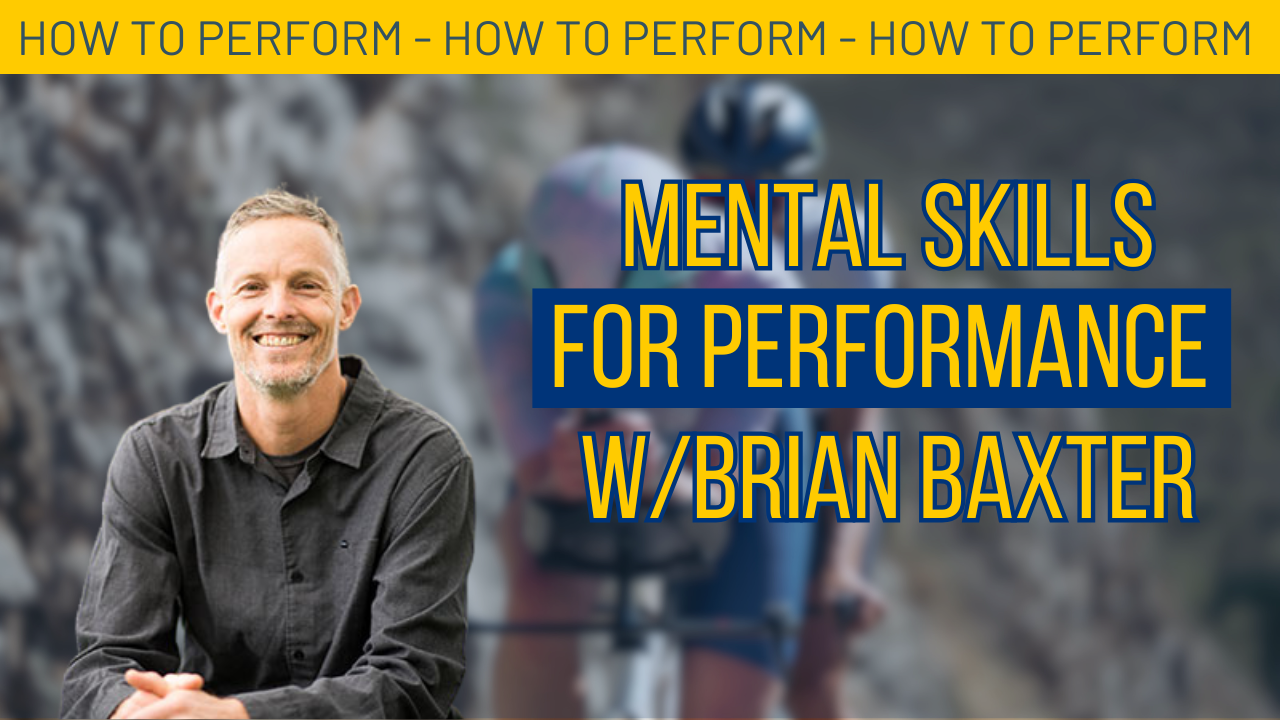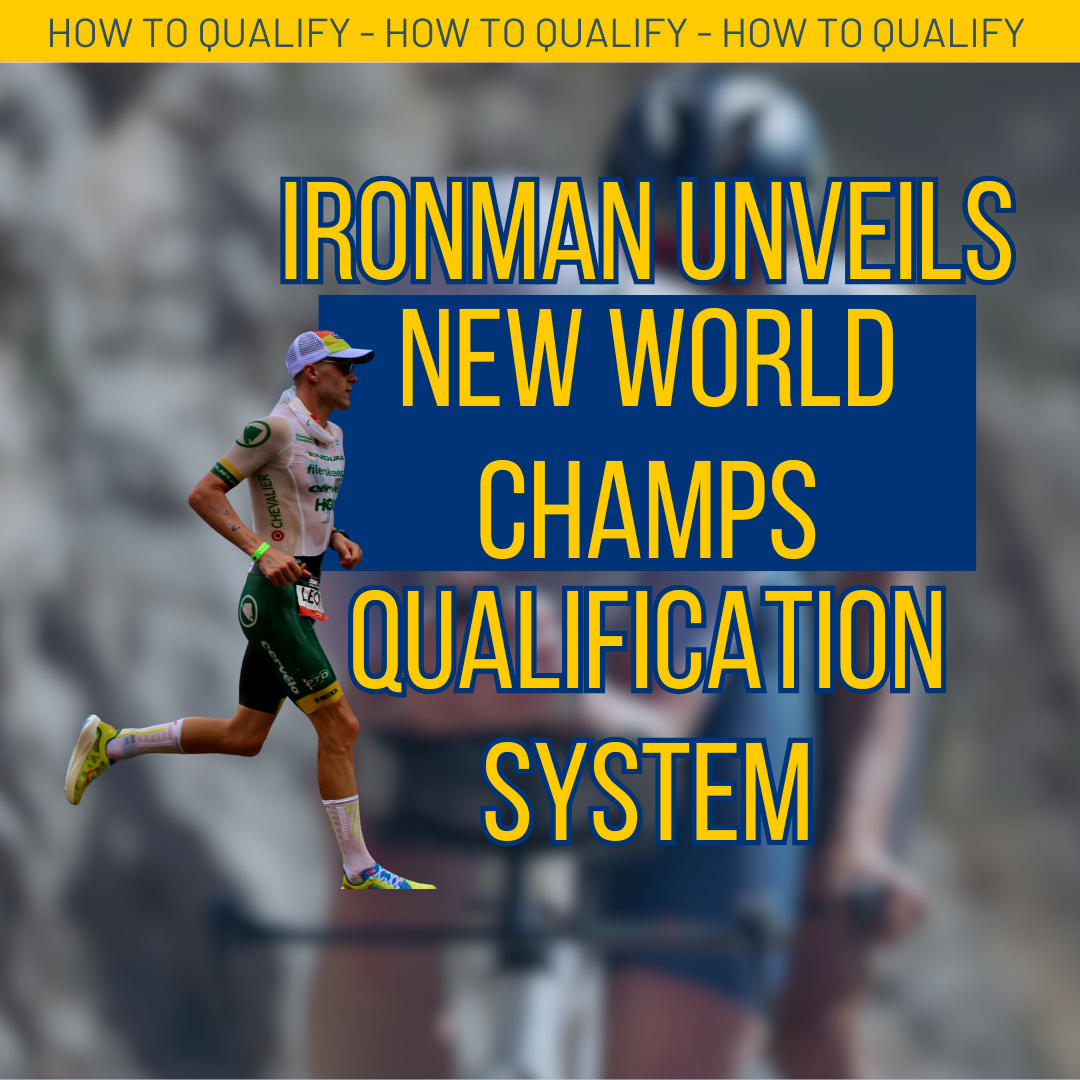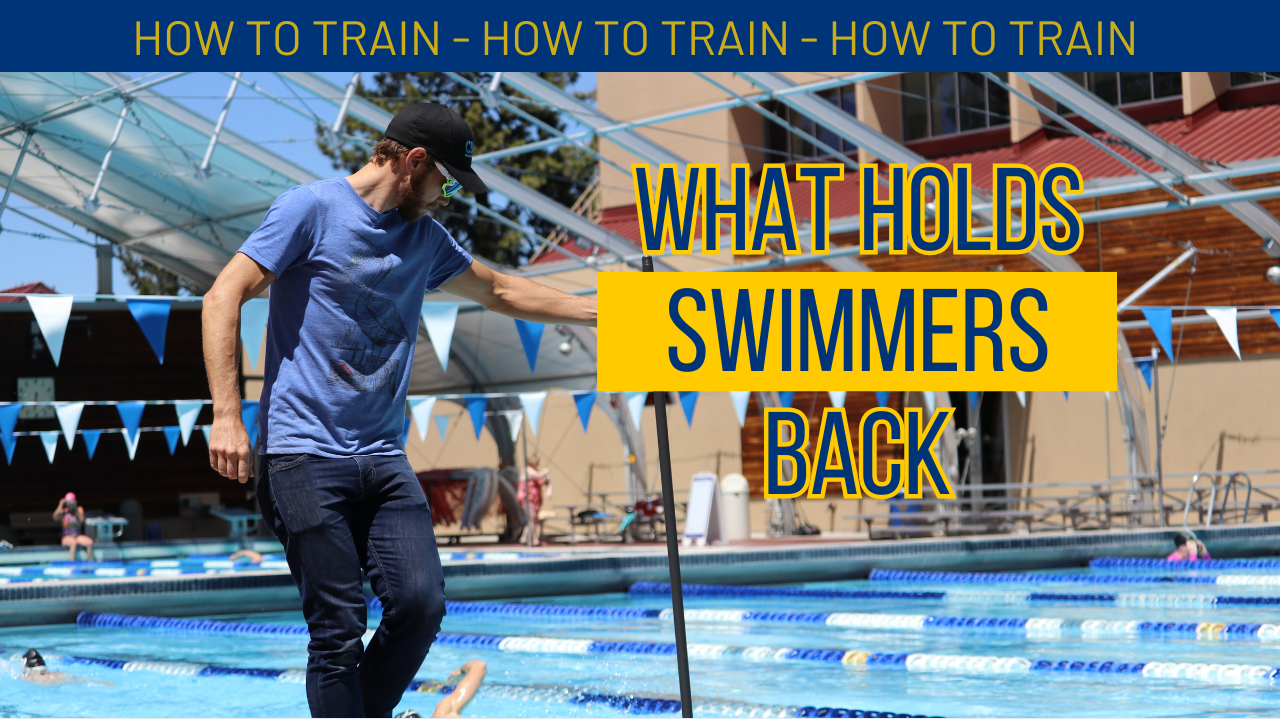
Episode 23: How Mental Skills Transform Athletic Performance with Sports Psychologist Brian Baxter
This interview with sports psychologist Brian Baxter reveals how mental training techniques can transform athletic performance at every level. Baxter, who has worked with athletes for over 20 years, breaks down the essential mental skills that separate good athletes from great ones, showing why anxiety management and confidence on the playing field or race course are just as crucial as physical preparation.
Baxter explains the well-known "control the controllables" philosophy that helps athletes focus their energy on what actually matters: effort, attitude, preparation, and present moment awareness. Brian explains how the endurance sports mindset functions differently from other sports, addressing the unique challenges that come with long training blocks and extended competition periods that can trigger pre-race anxiety strategies.
The conversation explores practical techniques, including energy management, showing how athletes can adjust their arousal levels for optimal performance; how to achieve flow state in sports more consistently; and why proactive mental training beats reactive responses to difficult moments during competition. Brian demonstrates how sports mental skills coaching addresses the thoughts -> emotions -> physiology performance formula that determines success on race day.
Whether you're struggling with performance anxiety or looking to take your mental game to the next level, this session provides actionable psychology tips and athletic performance mindset strategies for triathlon or any endurance sport you pursue. From understanding when anxiety becomes excitement, to learning visualization techniques that actually work, these insights will help you build the mental resilience that elite athletes use to achieve peak performances.
The interview includes real-world examples of how proper mental training helped Chris overcome a race penalty to achieve one of his best performances, illustrating how athlete confidence building through controllable focus creates unshakeable mental toughness during competition.
You can learn more about Brian at Amplify Sports Performance.

Episode 22: Ironman Unveils New World Championship Qualification System
The triathlon world erupted when Ironman announced their new age-graded qualification system for Kona. But after analyzing the actual numbers from recent races, the changes aren't nearly as earth-shattering as the internet forums suggest. Chris breaks down the math, examines real race data, and explains what aspiring qualifiers actually need to know.
If you want to read this podcast in article form, head on over to Chris’ breakdown here.
Want to talk to Chris about your training? You can book a free 45-minute analysis here.
Book a swim analysis with Chris: https://campfireendurance408.lpages.co/video-swim-analysis/
Ironman’s announcement: https://www.ironman.com/news/age-group-qualification-system

Episode 21: What Holds Swimmers Back from Improving
This comprehensive swim technique presentation reveals what really holds swimmers back and why swimming improvement is so different from cycling or running progress. As a Swim Smooth certified coach, Chris breaks down the five major swimming technique faults that prevent triathletes from swimming faster, demonstrating why swimming drills for adults require a completely different approach than other endurance sports.
Learn about the six Swim Smooth swim types and discover which category fits your current stroke patterns, from Bambinos struggling with anxiety, to Arnies trying to overpower the water, to Overgliders who want to TALK about swimming, rather than swim. This triathlon- and open-water swimming tips session covers essential techniques like proper catch and pull mechanics, fixing the dreaded crossover swimming fault, and developing effective bilateral breathing technique for open water conditions. Chris talks about common mistakes like straight-arm catch-and-pulls that act like brakes, bringing the hands forward too soon during recovery, and poor kick mechanics that waste energy.
Chris demonstrates proven swimming drills and ankle mobility exercises that address these issues, showing how the Swim Smooth coaching method focuses on individual swimmer needs rather than copying elite swimmer techniques. Whether you're preparing for your first triathlon or looking to break through a swimming plateau, this session provides the technical foundation every adult swimmer needs. From understanding why swimming ankle mobility matters to learning proper freestyle swimming technique, these insights will transform your approach to training in the water.
This episode is quite visual! If you want to see everything that’s going on, check out the video on our YouTube channel: https://youtu.be/1hbj52I7sQs

Episode 20: Self-Coached vs. Coached: Finding Balance in Triathlon with Business Owner and Mom Annie Solonika
In this candid conversation with former Campfire athlete Annie Solonika, we dive into what really matters in the coach-athlete relationship from both perspectives. Annie shares how a strong coach-athlete relationship requires clear communication and expectations from the start. As both a successful triathlete and business owner of Full Circle Stretching, Annie offers unique insights on balancing triathlon training with work and family life, showing how proper coaching can help busy athletes maintain consistency.
We explore the differences between self-coaching and working with a coach, discussing how training structure and accountability contribute to athletic development. Annie explains that effective coaching isn't just about training plans, but about creating a supportive community that keeps athletes motivated through challenging periods. The conversation highlights how listening to your body becomes an essential skill for endurance athletes, with proper coach feedback helping athletes distinguish between normal fatigue and warning signs.
For coaches, this interview provides valuable perspective on what athletes truly value in a coaching relationship, while athletes will gain insights on how to communicate their needs effectively. Whether you're considering hiring a coach or looking to improve your existing coaching relationship, this discussion offers practical wisdom for triathlon training consistency and finding balance between athletic goals and life commitments.

Episode 19: Professional Triathlete Ben Hoffman, or “Trying to Control More Doesn't Lead to More Control”
Chris sits down with professional triathlete Ben Hoffman, who has won eight Ironmans, seven 70.3 races, and landed on the podium an unreal 28 times, one of which was the 2014 Ironman World Championships in Kona, where he finished 2nd.
The biggest takeaway from this episode, I believe, is a concept that Ben returns to several times: you simply let your body express what it has been trained to do on race day, with a slight aim for "a higher level" because you are rested.

Episode 18: How Neglecting Your Swim Hurts Your Overall Triathlon Performance
I have heard it a million times: a triathlete tells me “I swam and swam but it never changed my time, so I just stopped swimming.” I really feel for this athlete, since they are clearly frustrated, but there’s a better way to train for triathlon. In this show we walk through:
What goes into effective endurance training in the first place
How neglecting your swim hurts your overall triathlon performance
How you should actually train to improve your swim performances
Swim Smooth Coaches Directory for Video Swim Analysis: https://www.swimsmooth.com/find-a-coach
RSVP for Chris’ lecture about what holds swimmers back: https://bendtriathlonclub.com/event-coaching

Episode 17: How to Pace a Hilly Race or Run
One of the hardest skills for any endurance athlete to master is pacing, and when you’re running a hilly event or participating in a bike race with a lot of elevation changes, pacing gets more difficult.
In this episode, Chris walks through the pitfalls athletes often fall into, the biggest of which is the “fly and die” approach where the athlete hopes to “bank” time by running harder or faster early in the race, hoping that when they inevitably slow down (because they went harder than they trained to run) that the time they banked will still keep them within their goal.
Sadly the endurance gods know what you are up to and will exact a cost in return…plus interest. In less nerdy terms this is called “blowing up.” Chris offers advice on how to avoid this ignominious fate and provides an example from the Portland Shamrock Run, where one of his athletes paced the race to perfection. You can see that athlete’s workout file below.

Episode 16: What is Progressive Overload and How Can You Actually Use It?
“Progressive Overload” is a topic that gets tossed around a lot in endurance circles, but, just as with other topics like “FTP” or “core strength” or “recovery,” progressive overload is more nuanced and complex than it first appears.
At it’s most basic application, progressive overload is “the steady and systematic increase in training load in order to continually force an athlete’s body to adapt and develop in the ways we want it to develop,” but how we apply that concept can get hairy pretty quickly.
In this episode, Chris defines the term, walks through different methods of measuring training load, explains the mechanism for getting your body to “adapt and develop,” and then offers practical suggestions of how to incorporate progressive overload into your own training or coaching of others. He rounds out the show with different subjective markers you can track in order to discover if your training is working or not, and when you should assess that training.
If you want to use Chris’ totally bonkers Session RPE training load calculator, you can find that here: https://tinyurl.com/bdekecsr

Episode 15: The Norwegian Method with Author Brad Culp
Chris sits down with Brad Culp, author of the 2024 Book The Norwegian Method: The Culture, Science, and Humans Behind the Groundbreaking Approach to Elite Endurance Performance. After some book-nerd talk about the structure Brad and his publisher chose for the book (the first few chapters provide a brisk but necessary and engrossing history of Scandinavia’s Viking culture and boatbuilding technology), Culp explains what he sees as encompassing “The Norwegian Method.” He talks about Kristian Blummenfelt, Gustav Iten, Olav Aleksander Bu, Jakob Ingebrigtsen, and the other less well-known forebears of The Norwegian Method. Culp recounts what he saw while reporting on and then writing about some of the greatest endurance athletes of our moment, and talks about how amateur endurance athletes can incorporate some of these training strategies without hurting themselves.
You can pick up Brad’s book on Amazon, and find him over on X.

Episode 13: How To Approach Getting Faster, Part One, w/Phil Batterson, Ph.D.
Chris sits down with Phil Batterson, Ph.D., host of the CriticalO2 podcast and physiologist for Moxy Monitor. They have a discussion about the oft-discussed “Art and Science of Coaching,” focusing on what coaches can learn from physiologists and vice versa. It’s a fascinating conversation that ranges from debunking long-observed tenets of the coaching world (FTP = 95% of 20-minute power, for one, and why 2mmol/l and 4mmol/l aren’t gospel) to best practices for improving your ability to make decisions in your training.

Episode 12: How to Build an Annual Training Plan that Actually Works
In this episode we talk about the importance of annual training plans for athletes and coaches, focusing on the need for clear goals and structured training blocks. We break down the types of goals you should use in your annual plans—outcome, performance, and process—and explain how to effectively build and manage a plan based on those goals. We give you three different examples of annual plans and offer hints and tips about how to use them to best effect: your performance and your happiness.
We also answer a great listener question about the significance of accountability in coaching, contrasting it with feelings of shame that can arise from missed workouts or unmet expectations.

Episode 11: Build the Engine First with Joe Howdyshell
Chris sits down with Joe Howdyshell of Summit Endurance Academy, a mountain sport coaching company based in Breckenridge, CO. What is a “mountain sport coaching company?” Joe (also known as @badasscoach on Instagram, although these days you can find him over on Substack talking to athletes) primarily coaches sports such as Ski Mountaineering (SkiMo for short), mountain biking, and mountain running.
“I work with athletes who want to play in mountains that look like the ones around me,” he says, although he’s also totally comfortable coaching road cyclists, triathletes, and more traditional endurance endeavors.
As with many coaches, Joe’s path to where he is today would be best described as “meandering.” No shade, there—most of us who work in the endurance world took a…circuitous path to our current situations. Joe came up as a runner, and then a cross-country skier, and finally a SkiMo athlete. He has bachelor and masters degrees in exercise physiology, so he knows his stuff, but as with the coaches at Campfire, he tends to keep the athlete first and the training minutiae second.
Instagram
Summit Endurance Academy
Substack
Work with us! If you heard something you liked today, join us! We’re always taking on new athletes, and you can book a free call to chat about your training here.

Episode 10: How to Develop Mastery in Endurance Sports
What is “mastery,” and how can we develop mastery in endurance sports? What even IS mastery? What does it look, sound, or feel like? In this episode, Chris walks through what mastery is and how you can begin to build mastery in your own sports.
If you’d like to learn this process through reading, check out our series on Mastery over on Medium. The link here is a friend link, so you’ll be able to read for free. Want the free PDF that helps you out with this? You can grab that here.
Part One
Part Two
Part Three
Part Four
Part Five
And, finally, if you’d like to talk to us about coaching, we’d love to chat! You can book a free training analysis here, getting some outside eyes on what it is you are doing.

Episode 9: How To Get Lean and Fast at the Same Time w/Alex Larson
Chris sits down with Alex Larson of Alex Larson Nutrition (ALN) about how she ended up in this role, why training in a fasted state is so unproductive, how she works with clients and athletes to “support endurance athletes with practical and simple nutrition advice for lifelong health and performance,” (ALN’s mission), and a whole bunch of poop!
Alex talks with us about how she achieves behavior change with her athletes, why she would like to shift away from the word “diet,” and why restricting food isn’t the mindset we should adopt around eating and fueling.
You can find Alex at Alex Larson Nutrition and on Instagram and Facebook @alexlarsonnutrition, playing with three kids, or watching all the Star Wars intellectual property she can get her eyes on.
